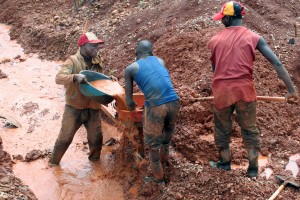Identifying social hotspots with life cycle assessment
Researchers at KTH Royal Institute of Technology have successfully conducted a social life cycle assessment (LCA) of a laptop computer. This is the first peer-reviewed study testing social LCA on a complex product.

The study evaluated impacts on human well-being throughout the lifecycle of a generic laptop from cradle to grave. The product system included material extraction, processing of raw materials, production and assembly, marketing and sales, use and disposal. A specific aim of the study was to identify social “hotspots”. These hotspots allow for a better understanding of where and when negative social impacts in the product systems of a laptop occur. Potential social impacts included safety and health, social security, involvement in armed conflicts, community engagement and corruption among others.
Gold mining site in Ituri/Congo, Photo: IPIS/Swedwatch

“Despite difficulties with data collection and issues of reliability of indicators we demonstrated that it is possible to conduct a social life cycle assessment on a complex product. Our study delivered unexpected results and more detailed information than one would expect,” says Elisabeth Ekener-Petersen, researcher at the KTH Centre for Sustainable Communications.
“When comparing countries where workers and the local community are at risk for severe negative social impacts, it was surprisingly countries such as Brazil, Saudi Arabia and Russia that were identified as hotspots,” says Elisabeth Ekener-Petersen.
In the general debate on social risks in the supply chain, these countries are hardly ever mentioned. For example, Brazil is a prime hotspot in the resource extraction phase indicating potential negative social impacts such as long working hours for workers at mining sites, delocalization of communities and a lack of concern for indigenous rights.
“If social LCA can highlight otherwise neglected hotspots, it is of great value for companies that are interested in improving their supply chain management,” says Catherine Karagianni, Manager for Environmental and Sustainable Development at TeliaSonera in Sweden.
“We argue that it is important to include also social aspects when making sustainability assessments of products and services,” says Professor Göran Finnveden, co-author of the study presented in two papers in the International Journal of Life Cycle Assessment.
The research team used the “ Guidelines for social life cycle assessment of products ” developed by the UNEP/SETAC Life Cycle Initiative. The study received financial support from Vinnova and partners of the Centre for Sustainable Communications at the KTH Royal Institute of Technology in Stockhol.
A longer version of this article was published at kth.se:
References
Ekener-Petersen, E., Finnveden, G. (2012) Potential hotspots identified by social LCA — part 1: a case study of a laptop computer . The International Journal of Life Cycle Assessment. DOI:10.1007/s11367-012-0442-7
Ekener-Petersen, E., Moberg, Å. (2012) Potential hotspots identified by social LCA – Part 2: Reflections on a study of a complex product. The International Journal of Life Cycle Assessment. DOI:10.1007/s11367-012-0443-6
Contact
Bernhard Huber (Communication Officer), bhuber@kth.se, tel +46-8-790 64 52
Elisabeth Ekener-Petersen (Researcher), elisabeth.ekener.petersen@abe.kth.se, +46-8-790 85 06
